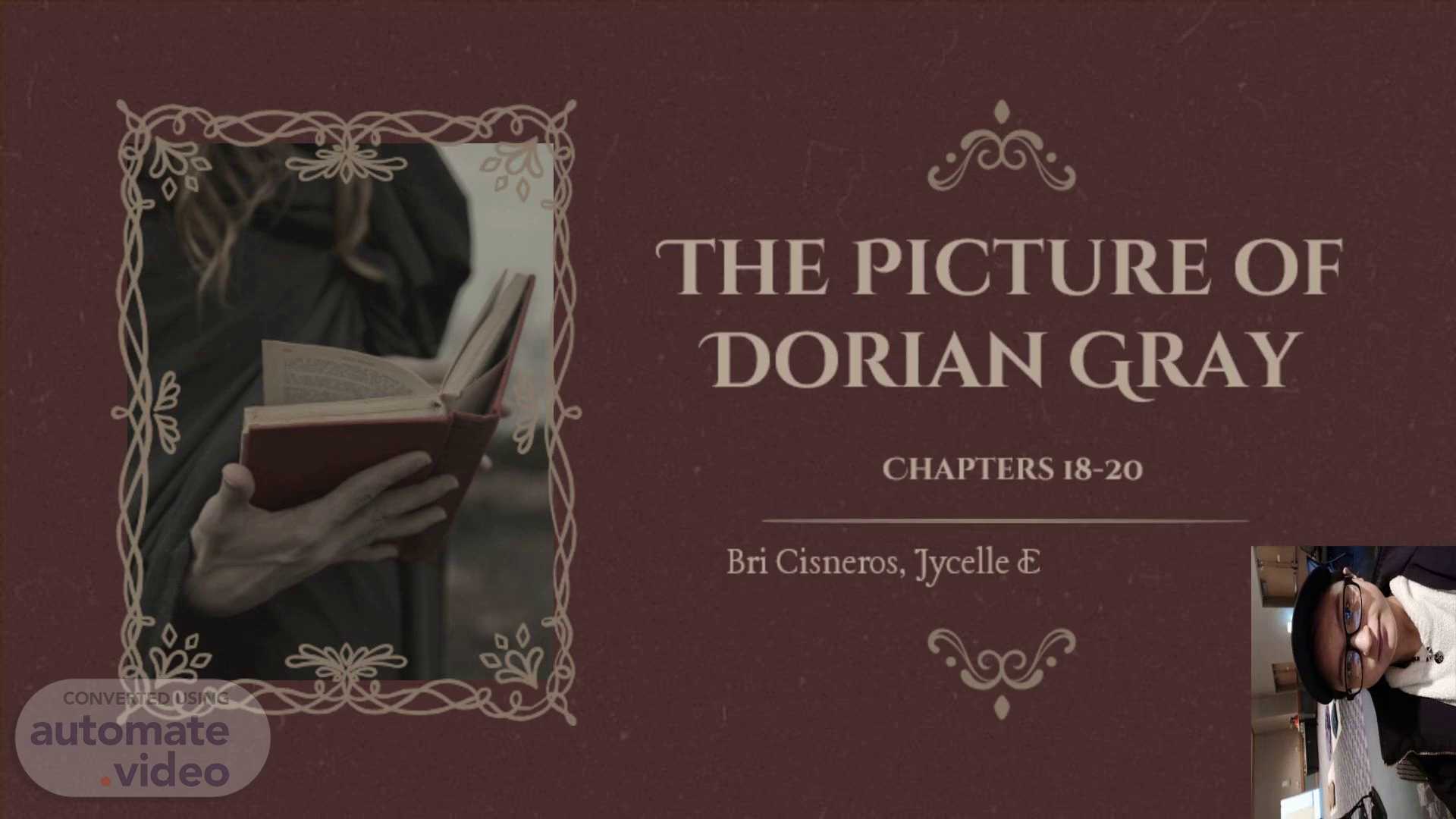Scene 1 (0s)
[image]. The Picture of Dorian Gray Chapters 18-20.
Scene 2 (16s)
[Audio] Dorian's growing paranoia prompts him to join hunters on a walk around the estate, where a fatal mistake takes place. Geoffrey, one of the hunters, accidentally shoots a man while targeting a hare. To Dorian's surprise, the deceased person turns out to be James Vane. This discovery brings him immense relief, as he believes he has finally escaped danger..
Scene 3 (44s)
[Audio] Dorian's realization that the man who was shot was James Vane, Sibyl Vane's brother, brought about a sense of relief and joy. He felt a sense of security knowing that his secret was now safe, and he was no longer threatened by James Vane's pursuit. This newfound freedom allowed him to return to his corrupt and selfish ways, as he was no longer held back by the fear of being discovered. His emotions shifted from guilt and anxiety to a sense of liberation, as he became aware that he could continue living his life without the burden of responsibility..
Scene 4 (1m 37s)
[Audio] Dorian's decision to restrain himself from being with the girl he loves appears to be a step towards redemption, but Lord Henry's words serve as a stark reminder that Dorian's corruption runs deep. Despite his efforts to change, Dorian remains trapped in his own selfish desires, unable to break free from the cycle of vanity and cruelty. His painting, once a symbol of beauty and youth, now serves as a haunting reflection of his true nature, a face without a heart..
Scene 5 (2m 14s)
[Audio] Dorian's treatment of life as an artistic creation, rather than a living, breathing experience, allowed him to disconnect from the moral implications of his actions. He became so enamored with his own beauty that he believed he could transcend the consequences of his deeds. However, this detachment ultimately led to his downfall, as he failed to recognize the harm caused by his selfish desires. The painting served as a constant reminder of his corruption, and his inability to confront the truth of his actions ultimately sealed his fate..
Scene 6 (3m 11s)
[Audio] Dorian Gray, the main character, is feeling conflicted and distressed about the actions he has taken in his past. Despite attempting to do a good deed, he realizes that his portrait has not changed back to its original state, but has instead become even more gruesome. Feeling guilty and wanting to make amends, Dorian considers making a confession to reverse the damage he has caused. However, he ultimately decides to deny his wrongdoings and instead focuses on destroying the evidence of his sins, the portrait. As he stabs the painting, he is met with the consequences of his actions as his appearance transforms into that of the horrific portrait. This event ultimately leads to his death and reveals the true Dorian - "withered, wrinkled, and loathsome of visage.
Scene 7 (3m 57s)
[Audio] Dorian's downfall is a direct consequence of his vanity and desire to stay young and beautiful. He believes that his portrait will bear the weight of his sinful deeds, allowing him to preserve his youthful appearance. However, this wish comes at a terrible price, as his portrait grows increasingly hideous while he remains youthful. This disparity between his physical appearance and inner corruption ultimately leads to his downfall. When he decides to destroy the portrait, he inadvertently takes his own life, as his true self is revealed in the portrait. His corruption and guilt have consumed him, leaving him with no escape from the consequences of his actions..
Scene 8 (5m 6s)
[Audio] Dorian's descent into madness and despair persists as he struggles to come to terms with the repercussions of his actions. His portrait, initially a representation of his vanity and youth, now functions as a perpetual reminder of his corruption and the genuine essence of his soul. As he contemplates its distorted form, he comprehends that he can no longer evade the harsh reality of his own depravity. With a sense of surrender, he determines to confront the darkness within himself, yet ultimately yields to its grasp. The final depiction of his withered, wrinkled, and repulsive visage serves as a striking illustration of the calamitous consequences of his decisions..
